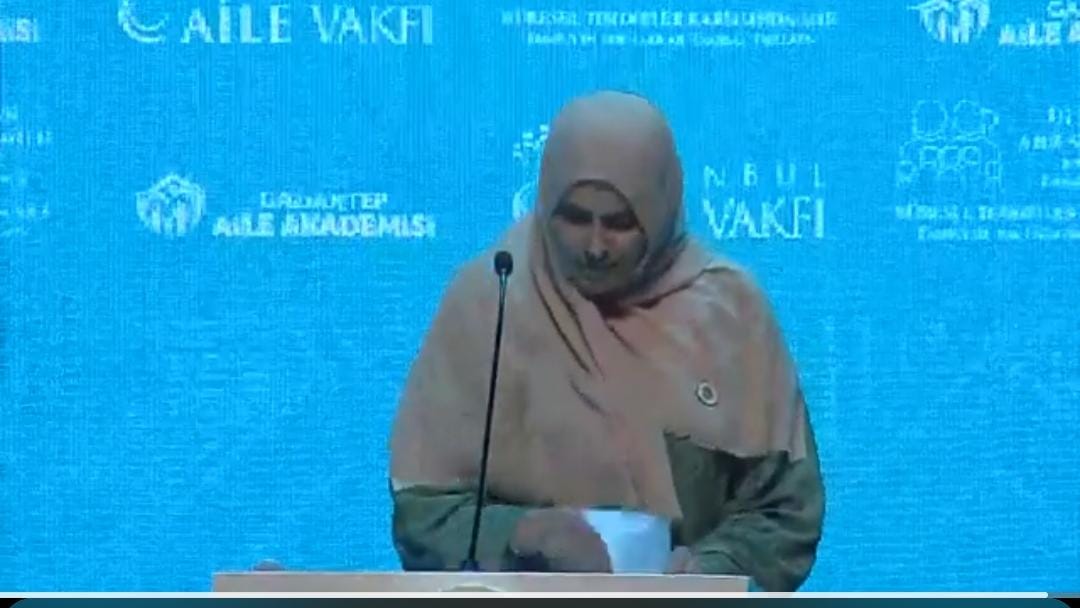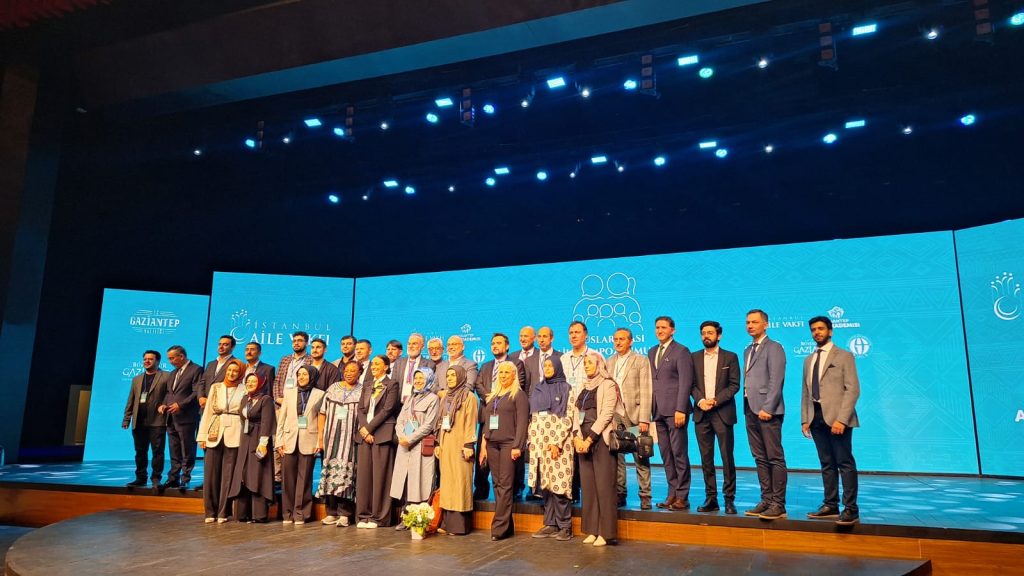
Ms. Sarah bint Amjad Hussein Badewi, Director of the Department of Family, Women and Childhood Affairs, represented the International Islamic Fiqh Academy in the international conference organized by Gaziantep University in Turkey, entitled “The Family Facing Global Threats,” between 10-12 May 2024. Ms. Badiwi delivered a speech at the conference’s opening session on Friday, 2 Dhul Quida 1445, corresponding to 10 May 2024, in the presence of the Deputy Minister of Family and Social Services and the Mayor of Gaziantep.
She began her speech by stating: “I am honored to be part of this esteemed gathering and to contribute, on behalf of the International Islamic Fiqh Academy, to the discussions on the family and its contemporary challenges. I commend the organizers for choosing this important and timely topic, especially considering the current challenges family relations face. As many of you know, preserving lineage and maintaining the sanctity of the family is one of the fundamental goals of Sharia recognized as one of the five universal goals common to all religions and beliefs. It is, therefore, an honor for me to represent the Secretary General of the International Islamic Fiqh Academy and to highlight some of the resolutions issued by the Academy on the importance of the family and its preservation.”
She explained that her contribution to the conference will focus on providing a brief overview of the International Islamic Fiqh Academy, presenting examples of the important resolutions it has issued, and then addressing the most critical challenges that threaten the family in this regard, namely homosexuality, homosexuality, and delayed marriage. Regarding the brief overview of the Academy, she stated that “The International Islamic Fiqh Academy, under the umbrella of the Organization of Islamic Cooperation (OIC), is the highest authority on jurisprudence for the Muslim world and its communities. Established in 1981 by the leaders of the 57 member states of the Organization of Islamic Cooperation (OIC), its main purpose is to clarify the appropriate Sharia rulings on current issues, provide Sharia solutions to contemporary life problems, and respond to the challenges and developments that arise in the lives of Muslims worldwide. The Academy clarifies the position of Islam on various issues and questions, including matters of faith, family, and financial transactions, while calling for moderation, tolerance, and coexistence”.
She pointed out that the Academy has always vigorously and steadfastly defended “the sanctity of the family institution and rejects any threat to their stability and prosperity. Furthermore, it prioritizes the protection of the rights of women and girls as vital partners in national development. The vision of the Academy is based on the principles of Islam and revolves around promoting peace, moderation, and compassion in society; to achieve this vision, the Academy has issued essential resolutions related to family, women, and childhood issues, including Resolution No. 114 (8/12) on the Islamic Declaration on the Role of Women in the Development of Muslim Society, which states:
“Second: A family that is based on an Islamic marriage constitutes the cornerstone of a healthy society. Therefore, Islam prohibits any other form of constituting a family. It also prohibits any other alternative relationships that fall beyond Shariah boundaries. By motherhood and other characteristics, women play a vital role in the stability and prosperity of the family. Third: Motherhood is one of the natural roles of the woman, which she can only fulfill properly and build up the generations to come if she obtains all the rights given to her by Islam, which also helps her fulfill her duties in her own areas of life. Fourth, Women and men are equal because both enjoy the honor of belonging to humanity. Moreover, women have various rights and obligations corresponding to their nature, abilities and character. Although men and women have different natural characteristics, their responsibilities are considered complementary in Shariah. Fifth: Call on for the respect of women in all areas of life and reject all offensive practices that they suffer from at the present times, such as domestic violence, sexual exploitation, licentious practices, prostitution, procurement, and inducement of women to commit adultery. These practices are quite prevalent in societies that degrade women and disregard their Islamic rights. Islam is sacrosanct from all these evil practices.”
She also mentioned that one of the important resolutions issued by the Academy on the same subject is “Resolution No. 38 (13/4) on combating moral evils: “A practical plan be worked out to safeguard the Islamic originality and heritage; abort all attempts to westernize and eliminate Islamic identity; to face all forms of challenges; to combat intellectual and cultural invasion that does not conform to Islamic principles and ethics. Strict Islamic censorship should be enforced on tourist activities and scholarship abroad to avoid the impairment of the Islamic personality and ethics.”
Ms. Badewi concluded her commentary on the Academy’s resolutions by saying: “Based on these and other resolutions, the International Islamic Fiqh Academy urges OIC member states to adhere to the teachings of Islam and avoid everything that contradicts them and to stress that the family is the basic unit of all societies, and that it is formed through the sacred bond between man and woman as preached by all religions.” She then spoke directly and explicitly about the most critical threat to the family in contemporary societies, including Muslim societies, such as the widespread recognition of the many challenges that threaten the traditional family structure consisting of a man and a woman, one of the most alarming being the claims by groups such as the LGBT communities for their rights to establish their lifestyles as so-called families. These claims are highly controversial and cause divisions between traditional Muslim communities and religious communities in the West. Therefore, it is necessary to promote and advocate for the traditional understanding of marriage and family for the goodness of humanity and to preserve the human species from erosion and extinction. Islam provides clear and consistent guidance on the institution of marriage and family formation and rejects anything deviating from the human species’ natural order and continuity. Hence, this conference is timely and fully aligned with our institution’s mission. We urge organizations that share these values to unite their efforts to promote the unique and natural concept of the family.”
In the meantime, she referred to the resolution no. 4/43c issued by the Independent Permanent Commission on Human Rights in the OIC’s 43rd Council of Foreign Ministers which states that the natural family, consisting of a father, mother, and children, has always been the cornerstone of fostering social relations, raising children, and transmitting values, which aims at building prosperous and vibrant societies across time and cultures, the fundamental meaning of marriage, defined as the union of a man and a woman, has remained essential to nurture, promote and protect the family and society. However, in recent times, the institution of marriage has come under attack by those who attempt to radically redefine it to include “the union of any two people,” i.e., “same-sex union.” She emphasized that marriage in Islam is a sacred religious contract between a man and a woman that imposes rights and duties aimed at the procreation, care and harmonious development of children and society as a whole.” The Quran explains that marriage, a union between the sexes, is a combination of love, tenderness, and care, so each finds completeness, reassurance and support in the other (Quran 30:21). This relationship goes beyond sexual intercourse to psychological and spiritual fulfillment. The Quran is clear in its condemnation of homosexuality. In the Quran, homosexuals are referred to as “Lot’s people”. As for our Prophet Muhammad (PBUH), it is proven that he said, “Allah has cursed those who do the actions of Lot’s people.” Hence, we continue to express our strong opposition and rejection of the legally flawed and deeply divisive concept of sexual orientation and gender identity, and believe that there is a need to present a well-researched counter-narrative on sexual orientation and gender identity (from the perspective of Islamic and international human rights law) in partnership with all segments of society, especially religious leaders, youth and the media, and disseminate it widely through the use of digital means. We also call for the formation of a broader coalition to take the necessary measures to ensure that young people receive the appropriate Islamic education that enables them to adhere to the principles and morals of Islam and to help them survive the spiritual vacuum that pushes them to indulge in drugs, alcoholic beverages, and all forms of immorality. They must participate in their national affairs and be entrusted with responsibilities according to their abilities and specialization. Therefore, we warn against media misrepresentations which distort the true image of Islam and the role it has played in preserving the traditional family and family values.”
Ms. Badewi also talked about another challenge threatening the family in this era, namely delaying marriage due to poverty and deprivation, and called for solving these challenges by facilitating marriage and reducing its costs and arrangements to preserve the human species.
She concluded her speech, stating, “We at the International Islamic Fiqh Academy believe that there is an urgent need for more cooperation and solidarity to implement shared values at the global level practically. Preserving the sanctity of family, especially traditional and natural marriage, is a major challenge that must be strongly defended. The concept of marriage, defined as a legal contract between consenting adults aimed at forming a family and ensuring the continuity of the human species, must be united to protect and strengthen family institutions, especially traditional marriage, against all threats and challenges. This requires pooling intellectual resources to develop a coordinated strategy that clearly defines the unique characteristics of marriage. To counter this phenomenon surrounding sexual orientation and gender identity, a comprehensive narrative must be crafted in collaboration with various sectors, including religious leaders, youth, and the media, using modern information and communication technologies to spread the message widely and counter the propaganda against this position, and governments and institutions must make every effort to facilitate marriage for those who seek it.”
Read Also
Lastest









